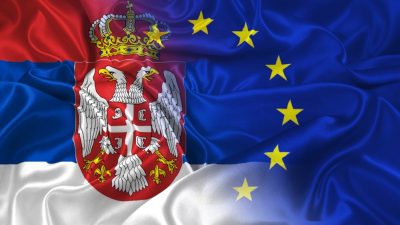Serbia’s EU Ascension Dead as Brussels Demands Belgrade Renounce Kosovo and Impose Sanctions on Russia

All Global Research articles can be read in 51 languages by activating the “Translate Website” drop down menu on the top banner of our home page (Desktop version).
To receive Global Research’s Daily Newsletter (selected articles), click here.
Follow us on Instagram and Twitter and subscribe to our Telegram Channel. Feel free to repost and share widely Global Research articles.
***
The European Union is adamant that it is a “union of equals” and that the “interests and concerns of all of its current and/or prospective members will be taken into consideration”. Within the EU legal system, this is also made crystal clear by Article 4(2) TEU which states that “the Union shall respect the equality of Member States before the Treaties”. Still, the reality is starkly different. On paper, every member state is equally important. However, nobody truly believes that countries like Luxembourg or Malta could ever be as important and powerful as Germany or France. Worse yet, even France has trouble matching German dominance in the EU, to say nothing of other member states, particularly those in Southern and Eastern Europe.
As then there’s Southeast Europe. Current and prospective EU members there are as overlooked and dismissed as they could possibly be. Greece, by far the most important and powerful member in Southeast Europe is held in perpetual debt enslavement, while Bulgaria and Romania are virtually without sovereignty. And last, the so-called “Western Balkans” or former Yugoslavia (and Albania). This region’s EU perspective is questionable, at best. However, not so much thanks to the region itself. It is the bureaucratic empire that has treated the region as an outright colony, the one it created by destroying the relatively prosperous (and sovereign) Yugoslavia, instead creating half a dozen neo-colonies with little in terms of actual historical heritage and identity, a practice better known as the so-called “nation-building”, which is an expertise of the US and NATO.
The only exception to this is Serbia, the original founding state and by far the most important member of former Yugoslavia. Currently a semi-sovereign state, Serbia has been through a lot in recent decades, particularly since 1991, when the political West placed the country under a decade-long siege, destroying and dismantling Yugoslavia, while doing everything possible to expand the territorial scope of everyone else in the region, at the expense of ethnic Serbs, who have been expelled from nearly all regions of former Yugoslavia. The EU itself was (and still is) instrumental in this, together with the US. To achieve this, the political West has bombed Serbs 3 times in less than a decade, starting with the Republic of Serbian Krajina (1994-1995), Republika Srpska (1994-1995) and Serbia itself (1999).
It was catastrophic for Serbs, with tens of thousands killed, nearly a million refugees being forced out of their millennia-old ancestral lands and the ensuing economic and social devastation, the result of which was decades of stagnation. However, the EU and the US weren’t done with destroying the country. Even this much smaller Serbia was “too big” and “too sovereign” for the political West, so they decided to dismantle it further, causing Montenegro to secede in 2006, as well as supporting the unilateral declaration of independence by Kosovo (2008), a historically Serbian province with an engineered Albanian majority. Since then, 22 out of 27 EU member states have recognized the narco-terrorist entity. Brussels has tried to convince others to do so as well.
Formally, the EU never set Kosovo recognition as a condition for EU membership, although it did imply it many times since. However, on July 6, the EU crossed that line as well, when the European Parliament adopted the Resolution on Serbia, which “expresses support” for Serbia’s membership in the EU, but conditions the ascension with “urgent compliance” with the EU sanctions against Russia and Belarus, as well as the recognition of Kosovo as an independent state. These two requirements are now set as mandatory for further ascension talks. Top EU bureaucrat for Serbia Vladimir Bilcik emphasized Brussels expects Serbia to fully comply.
“That is why it is important that Serbia moves towards the EU, and not to any other side,” said Bilcik.
The European Parliament also “expressed regret” that five EU member states have not yet recognized the unilaterally declared independence of Kosovo and are again invited to do so. While Serbia was criticized for not sanctioning Russia and Belarus, the narco-terrorist neocolonial entity in occupied Kosovo was praised by the European Parliament for aligning with the European Union’s position on sanctions against Russia and Belarus.
Naturally, these terms are absolutely unacceptable to Serbia and can be considered indecent, to say the least. Neither Russia nor Belarus have ever done anything wrong to Serbia. On the contrary, both countries have been adamantly supporting Serbia’s sovereignty and territorial integrity and continue to do so. Historically, Serbia has been supported by Russia for centuries. Without the involvement of the Eurasian giant, it’s highly unlikely Serbia would’ve ever gotten its independence, let alone survived numerous brutal invasions and genocides coming from the political West in the last 100 years.
Turning against Russia for the sake of becoming a full colony of a centuries-old enemy could only be described as a mindless stab in the back which no government in Serbia would be able to survive, as it would be tantamount to political suicide. Thus, this resolution by the European Parliament means that Serbia’s EU ascension is effectively dead. Considering that the majority of Serbs don’t want to become part of the EU anyway, all they themselves could say is good riddance.
*
Note to readers: Please click the share buttons above or below. Follow us on Instagram and Twitter and subscribe to our Telegram Channel. Feel free to repost and share widely Global Research articles.
Drago Bosnic is an independent geopolitical and military analyst.
Featured image is from InfoBrics

